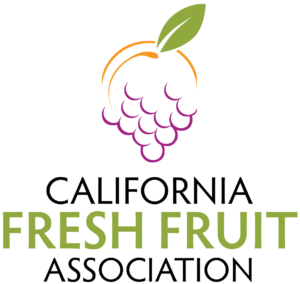Jul 13, 2023
California Fresh Fruit Association growers supported by Farm Credit
Every summer, people around the country enjoy luscious fruits like apricots, table grapes, kiwis, peaches and plums. Because California is the nation’s largest producer of those commodities, there’s a high chance the fruits were grown in the Golden State.
Working to protect the interests of growers of these and several other permanent fruit crops is the California Fresh Fruit Association (CFFA). With roots dating back to 1921, it’s one of the oldest agricultural trade associations in California, Courtney Razor, CFFA’s director of member services and communications, said in a news release.
 CFFA is a public policy organization that advocates on behalf of 13 permanent, fresh fruit commodities, from blueberries to stone fruit to table grapes, Razor said in the release. It advocates for grower and shipper members at the local, state and federal levels on an array of issues including labor, water, trade and food safety.
CFFA is a public policy organization that advocates on behalf of 13 permanent, fresh fruit commodities, from blueberries to stone fruit to table grapes, Razor said in the release. It advocates for grower and shipper members at the local, state and federal levels on an array of issues including labor, water, trade and food safety.
The association’s 350 members range from Lake County in the north to the Coachella Valley in Southern California’s desert region, with the bulk of operations clustered in the Central Valley between Madera and Kern counties.
Without CFFA members, consumers would enjoy much less fresh fruit, Keith Hesterberg, Fresno Madera Farm Credit’s president and CEO, said in the release.
“According to state statistics, California growers lead the nation in the production of apricots, figs, table grapes, kiwis, nectarines, peaches, persimmons, plums and pomegranates – and second nationally in blueberries and cherries,” Hesterberg said in the release. “The state is the sole source of American production of kiwis, nectarines, clingstone peaches and plums. Farm Credit is proud to support many different commodities like fresh fruit that are such important parts of California agriculture.”
Farm Credit Alliance members AgWest Farm Credit, American AgCredit, CoBank and Fresno Madera Farm Credit are CFFA supporters and are part of the nationwide Farm Credit System – the largest provider of credit to U.S. agriculture.
 Water supply and implementation of the state’s groundwater management system were key priorities, even in this extremely wet water year, Razor said in the release.
Water supply and implementation of the state’s groundwater management system were key priorities, even in this extremely wet water year, Razor said in the release.
On the labor front, CFFA members were disappointed in the passage of AB 2183 last year, which permits so-called “card check” voting for union representation instead of secret-ballot elections that allow workers to vote without fear of coercion. She said the association has been working with other ag organizations to educate members about how to comply with the new requirements. The group is also supportive of technological research and mechanization with the goal of making farm practices more efficient.
Razor credits the association for rising to the occasion during the COVID-19 pandemic to ensure CFFA members and their employees maintained access to personal protective equipment and vaccinations so growers could provide safe working environments and ensure fruit could be harvested and transported to consumers.
“The issues CFFA works on are absolutely critical to the success of our state’s fruit growers – indeed, all of California’s farmers and ranchers,” Mark Littlefield, AgWest Farm Credit’s president and CEO, said in the release. Supporting organizations advocating for California agriculture is an important priority for Farm Credit’s philanthropical efforts.
“Without water, a labor force and the ability to export crops overseas, the industry that feeds the nation and the world could not exist, which is why it’s so important that CFFA and other advocacy organizations do such a great job of educating policymakers here in California and in Washington, D.C.”
AgWest Farm Credit, American AgCredit, CoBank and Fresno Madera Farm Credit are cooperatively owned lending institutions providing agriculture and rural communities with a dependable source of credit. For more than 100 years, the Farm Credit System has specialized in financing farmers, ranchers, farmer-owned cooperatives, rural utilities and agribusinesses.









